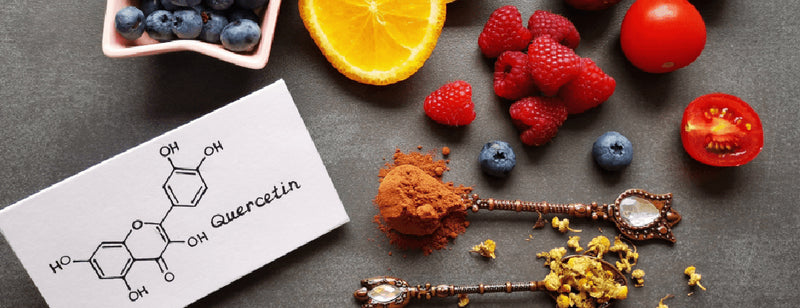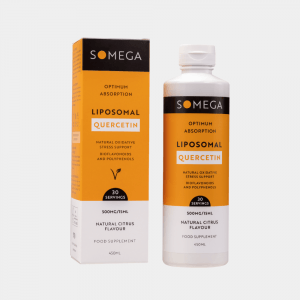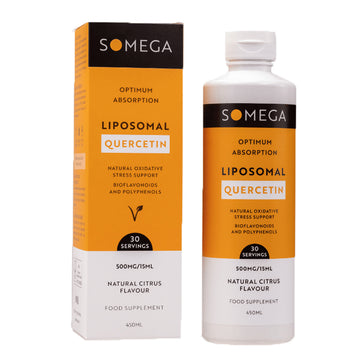Introducing Liposomal Quercetin, the newest addition to the SOMEGA range. Not familiar with quercetin? You’re not alone. A lesser known nutrient, quercetin has been gaining attention in recent years having been linked to a number of health benefits. In this blog, we’ll discuss quercetin, its benefits, and whether supplementation may be useful for you.
What Is Quercetin?
Quercetin belongs to a group of beneficial plant compounds called bioflavonoids. Bioflavonoids are a type of plant pigment that are responsible for giving plants, such as fruits and vegetables, their vibrant colours. These pigments also act as powerful antioxidants. Antioxidants protect the body against everyday toxins and stressors, and are essential to health.
It is this antioxidant activity, along with its anti-inflammatory and anti-allergic properties, that has led to an increased interest in quercetin and its potential benefits to health.
Sources Of Quercetin
We can’t naturally synthesise quercetin in the body, so we must consume it through food sources or from supplements. Quercetin can be found in a range of foods such as fruits, vegetables, nuts, and grains, but is particularly abundant in:
- Apples
- Onions
- Berries
- Grapes
- Broccoli
- Citrus fruit
- Capers
- Green tea
- Red wine
There are also high levels of quercetin in the flowers of the Sophora japonica tree (also known as the Japanese pagoda tree) and it is this natural extract that is used in SOMEGA Liposomal Quercetin. Due to the potency of the extract, just one serving (15ml) of this supplement provides 500mg of quercetin. To get the same amount of quercetin from foods, you would need to eat 12.5kg of apples or 4kg of blueberries or just over 1kg of red onions!
Benefits Of Quercetin
- Antioxidant
The beneficial health effects associated with quercetin are mainly due to its ability to act as a potent antioxidant in the body, protecting our cells from damage by fighting molecules called free radicals.
Free radicals are found in the environment and also created in our cells through normal body processes. When levels of free radicals rise and outpace antioxidant levels, the imbalance creates oxidative stress.
Oxidative stress is associated with several chronic conditions including diabetes, Alzheimer’s, cardiovascular disease and cancer. This is why maintaining strong levels of antioxidants, such as quercetin, is important for our health (Ref. 1).
- Anti-inflammatory
Oxidative stress can also trigger chronic inflammation (Ref. 2). While some inflammation is necessary to help your body heal and fight infections, long-term inflammation is linked to health problems, including diabetes, cardiovascular disease and certain cancers (Ref. 3).
Research shows that quercetin may help to reduce inflammation (Refs. 4,5). By scavenging free radicals, quercetin can reduce oxidative stress and prevent the build up of chronic inflammation in the body.
One study published in the Journal of the American College of Nutrition, looked at 50 women with rheumatoid arthritis, an inflammatory and autoimmune disease. The results showed that supplementing with 500 mg of quercetin per day for eight weeks helped reduce morning stiffness and pain (Ref. 6).
- Anti-allergic
Quercetin may also have anti-allergic effects (Ref. 7). It has been seen to act as an antihistamine, reducing the release of histamine and other inflammatory mediators that contribute to allergy symptoms (Ref. 8).
A study published in 2022 investigating the effects of quercetin supplementation in participants with seasonal allergy, found that over four weeks, participants who took the quercetin supplement experienced a significant improvement in allergy symptoms like itchy eyes, sneezing and nasal discharge, compared to those who were not supplementing with quercetin (Ref. 9).
- Other Possible Health Benefits
There is also research to suggest that quercetin may have beneficial effects on blood pressure (Ref. 10), diabetes (Ref. 11), age-related cognitive decline (Ref. 12), and exercise endurance (Ref. 13).
Who Can Benefit From Quercetin Supplementation?
Adequate antioxidant intake is important for everybody. Luckily, quercetin is present in many delicious plant-based foods, so by including quercetin-rich foods in our diet regularly we can support our overall health. However, quercetin supplements typically provide a much higher dose of quercetin than food sources, and may be beneficial for:
- Those who don’t typically eat a large amount of fruits and vegetables
- Those looking to increase their antioxidant intake
- Those with inflammatory conditions such as rheumatoid arthritis (Ref. 6)
- Those looking to alleviate allergy symptoms (Ref. 9)
- Those looking to improve their cardiovascular health (Ref. 10)
- Those with diabetes (Ref. 11) or age-related cognitive decline (Ref. 12)
Ensuring the quercetin you’re ingesting is actually absorbed by the body is also important. The general absorption of quercetin by the body is relatively low (Ref. 14). This is why SOMEGA Liposomal Quercetin is formulated using liposomal technology, increasing its bioavailability and ensuring optimum absorption and cell delivery, and maximum health benefits. Shop here.
Always consult a healthcare practitioner before starting a new supplement regime, especially if you are on medication or taking any other supplements.
About the Author
Lucy Brennan is a registered associate nutritionist (ANutr) and freelance writer specialising in health, nutrition and wellness content. She holds a BSc. in Public Health Nutrition and has over 4 years’ experience working in health communication, which is where her passion lies. Lucy is dedicated to providing evidence-based content that is both engaging and accessible and inspires readers to make informed choices regarding their health.
References
- Alkadi H. (2020). A Review on Free Radicals and Antioxidants. Infect Disord Drug Targets, 20(1), 16-26. https://pubmed.ncbi.nlm.nih.gov/29952268/
- Hussain T, Tan B, Yin Y, Blachier F, Tossou MC, Rahu N. (2016). Oxidative Stress and Inflammation: What Polyphenols Can Do for Us? Oxid Med Cell Longev, 2016, 7432797. https://www.ncbi.nlm.nih.gov/pmc/articles/PMC5055983/
- Furman D, Campisi J, Verdin E, Carrera-Bastos P, Targ S, Franceschi C, Ferrucci L, Gilroy DW, Fasano A, Miller GW, Miller AH, Mantovani A, Weyand CM, Barzilai N, Goronzy JJ, Rando TA, Effros RB, Lucia A, Kleinstreuer N, Slavich GM. (2019). Chronic inflammation in the etiology of disease across the life span. Nat Med, 25(12), 1822-1832. https://www.nature.com/articles/s41591-019-0675-0
- Mohammadi-Sartang M, Mazloom Z, Sherafatmanesh S, Ghorbani M, Firoozi D. (2017) Effects of supplementation with quercetin on plasma C-reactive protein concentrations: a systematic review and meta-analysis of randomized controlled trials. Eur J Clin Nutr, 71(9), 1033-1039. https://pubmed.ncbi.nlm.nih.gov/28537580/
- Sato S, Mukai Y. (2020) Modulation of Chronic Inflammation by Quercetin: The Beneficial Effects on Obesity. J Inflamm Res,13, 421-431. https://www.ncbi.nlm.nih.gov/pmc/articles/PMC7425105/
- Javadi F, Ahmadzadeh A, Eghtesadi S, Aryaeian N, Zabihiyeganeh M, Rahimi Foroushani A, Jazayeri S. (2017) The Effect of Quercetin on Inflammatory Factors and Clinical Symptoms in Women with Rheumatoid Arthritis: A Double-Blind, Randomized Controlled Trial. J Am Coll Nutr, 36(1), 9-15. https://pubmed.ncbi.nlm.nih.gov/27710596/
- Mlcek J, Jurikova T, Skrovankova S, Sochor J. (2016) Quercetin and Its Anti-Allergic Immune Response. Molecules, 21(5), 623. https://www.mdpi.com/1420-3049/21/5/623/htm
- Jafarinia M, Sadat Hosseini M, Kasiri N, Fazel N, Fathi F, Ganjalikhani Hakemi M, Eskandari N. (2020) Quercetin with the potential effect on allergic diseases. Allergy Asthma Clin Immunol, 16, 36. https://aacijournal.biomedcentral.com/articles/10.1186/s13223-020-00434-0
- Yamada S, Shirai M, Inaba Y, Takara T. (2022) Effects of repeated oral intake of a quercetin-containing supplement on allergic reaction: a randomized, placebo-controlled, double-blind parallel-group study. Eur Rev Med Pharmacol Sci, 26(12), 4331-4345. https://www.europeanreview.org/wp/wp-content/uploads/4331-4345.pdf
- Serban MC, Sahebkar A, Zanchetti A, Mikhailidis DP, Howard G, Antal D, Andrica F, Ahmed A, Aronow WS, Muntner P, Lip GY, Graham I, Wong N, Rysz J, Banach M. (2016) Effects of Quercetin on Blood Pressure: A Systematic Review and Meta-Analysis of Randomized Controlled Trials. J Am Heart Assoc. 5(7), e002713. https://pubmed.ncbi.nlm.nih.gov/27405810/
- Dhanya R. (2022) Quercetin for managing type 2 diabetes and its complications, an insight into multitarget therapy. Biomed Pharmacother, 146, 112560. https://www.sciencedirect.com/science/article/pii/S0753332221013470?via%3Dihub
- Costa LG, Garrick JM, Roquè PJ, Pellacani C. (2016) Mechanisms of Neuroprotection by Quercetin: Counteracting Oxidative Stress and More. Oxid Med Cell Longev, 2016, 2986796. https://pubmed.ncbi.nlm.nih.gov/26904161/
- Kressler J, Millard-Stafford M, Warren GL. (2011) Quercetin and endurance exercise capacity: a systematic review and meta-analysis. Med Sci Sports Exerc, 43(12), 2396-404. https://pubmed.ncbi.nlm.nih.gov/21606866/
- Berkel Kaşıkçı M, Bağdatlıoğlu N. (2016). Bioavailability of Quercetin. Curr Res Nutr Food Sci, 4, 146-151. https://www.researchgate.net/publication/309603709_Bioavailability_of_Quercetin















